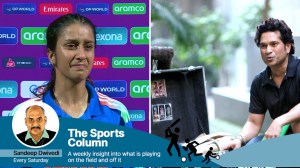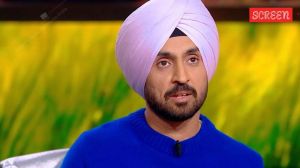‘From playboy to a fair boy’: In Sanatan Dharma row, Udhayanidhi finds his political feet
Despite now being in politics for 9 years, the DMK heir apparent was seen as a lightweight, focused on his films which steered clear of political, social messaging. All that is changing
 Played right, Udhayanidhi's political career may be ready for the kind of bounce that eluded his father and Tamil Nadu Chief Minister M K Stalin. (Facebook/Udhayanidhi Stalin)
Played right, Udhayanidhi's political career may be ready for the kind of bounce that eluded his father and Tamil Nadu Chief Minister M K Stalin. (Facebook/Udhayanidhi Stalin) In Tamil Nadu, where cinema is as potent as politics, Udhayanidhi Stalin is the latest to make the transition from one to the other. Not seen as very political for a long time, as he built a film career for himself, the 45-year-old could not have imagined a better political launch.
The row triggered by his Sanatan Dharma remarks – drawing the attention of Prime Minister Narendra Modi, no less – pitches him as a strong Dravidian, anti-BJP voice that can pay rich political dividends in Tamil Nadu. At the same time, it ensures name recall across the country for the heir to the M Karunanidhi family dynasty.
Played right, Udhayanidhi’s political career may be ready for the kind of bounce that eluded his father and Tamil Nadu Chief Minister M K Stalin. Unlike his father Karunanidhi’s record as a famed Tamil film scriptwriter, his son Udhayanidhi’s career as an actor and owner of the state’s largest production house, and the DMK’s own interlinks with cinema, Stalin had no stint in the tinsel world. There were political compulsions that saw him enter politics at a young age, including the Emergency during which Stalin faced arrest as well as torture, but even in politics, he slogged on in Karunanidhi’s large shadow.
It was finally the doyen’s demise that paved the way for Stalin to take over as DMK chief and become CM, at the age of 68.
Twice removed from the power dynamics, Udhayanidhi at the time focused on acting, that too taking on casual roles, with him and Santhanam making a hit comedy duo. Unlike other Tamil cinema counterparts, his films carried no overt political or social messages. This clear distinction, between business and politics, was a departure from the 1950s and ’60s, where party ideologies were fervently projected through cinema.
The road to Karunanidhi's political legacy is not easy for Udhayanidhi. Even among his contemporaries, the late DMK leader stood hands and shoulders higher, burnished by many political agitations such as the anti-Hindi movement and Kallakurichi rail roko of the 1950s, with a direct connect to the masses through his writings.
Even when Udhayanidhi ventured into politics around 2014, his films remained unchanged. This wall between the two worlds continued, perhaps making it easier for mega stars such as Rajinikanth to associate themselves with Udhayanidhi’s Red Giant film productions, as well as Sun Productions, linked to the Karunanidhi family.
Incidentally, the first film of Udhayanidhi’s career with a strong social and political theme, Maamanan, came only recently – in a striking coincidence with his sudden bursting onto the national scene with the Sanatan Dharma remarks. In the film, Udhayanidhi plays the son of a Dalit political leader, who faces discrimination within his party, that talks of social justice, despite being an MLA.
However, the road to Karunanidhi’s political legacy is not easy for Udhayanidhi. Even among his contemporaries, the late DMK leader stood hands and shoulders higher, burnished by many political agitations such as the anti-Hindi movement and Kallakurichi rail roko of the 1950s, with a direct connect to the masses through his writings.
A senior DMK minister, seen as close to the family, says Udhayanidhi recognises the challenge before him if he has to forge a path in politics of today, which is very different from the time of his grandfather’s and which carries the strong imprint of the BJP’s aggressive Hindutva. “Just like his grandfather, whose speeches and protests were different from other leaders, Udhayanidhi has to prove that he is not getting his position on a platter. He has begun delving into the legacy now,” says the minister, referring to the Sanatan Dharma row.
Where Udhayanidhi is closer to Karunanidhi than Stalin is that he is a good orator, sprinkling his speeches with sharp wit and catchy remarks. “His modus operandi is effective, like carrying a brick to campaign in the last Assembly elections to expose the BJP’s promise of the Centre having built an AIIMS in Madurai, when the project hadn’t even taken off,” the DMK minister says.
DMK leaders also believe Udhayanidhi hit Modi right where it hurts by linking the fact that President Droupadi Murmu was not invited for the new Parliament building’s inauguration by the Centre as an example of “caste discrimination”, while talking about the ills of Sanatan Dharma.
But is Udhayanidhi well-versed in the complexities of Sanatan Dharma, particularly in the context of Hindu religion as defined by the BJP? Maybe not, says one of his aides. The aide, who was also close to Karunanidhi, also acknowledges that the DMK doyen would have found better framing to make the same points about Sanatan Dharma than Udhayanidhi did. “Karunanidhi would not have used disease metaphors such as malaria or COVID for a faith, though delivering a stronger message,” the aide says.
But the DMK, which once swore by atheism, and its first family, now inhabit different times, where singular identities are hard to sustain. Udhayanidhi has never identified himself as an atheist, for example, and till he became a minister, his house had a puja room. Stalin never went that far, but his wife is known to be religious.
Udhayanidhi, another aide says, is learning to straddle the two paths.
He recalls an incident from a few years back when Udhayanidhi tweeted an image holding a Vinayagar idol, on the occasion of Vinayagar Chathurthi, wishing everyone for the festival. “Hours later, following the intervention of his father, the tweet was deleted,” says the aide, adding that Udhayanidhi perhaps realised then that he needed to engage more with the essential questions surrounding culture, faith and an atheist ideology that the DMK juggles.
According to the aide, Udhayanidhi has since made an effort to fill the gap, reading up on Karunanidhi’s autobiography, Nenjukku Neethi, as well as books on the lives of Periyar and DMK founder C N Annadurai, who laid the foundational beliefs of the party.
“The reading list keeps expanding. One of his assistants usually suggests key portions from books for his daily reading everyday. Currently he is reading Ambedkar’s writings,” the aide says.
In his words, what we are seeing is Udhayanidhi’s transformation, “from a playboy to a fair boy”.



- 01
- 02
- 03
- 04
- 05



























